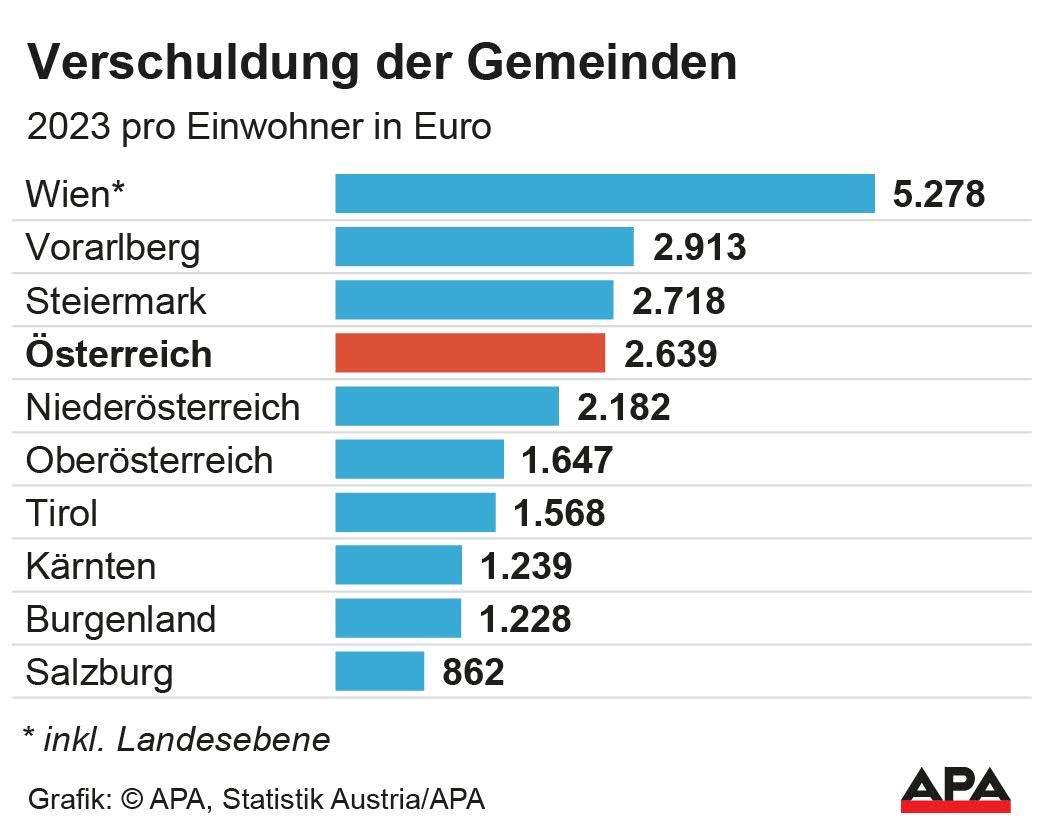Municipal Debt in Austria Strongly Dependent on the Federal State

For example, the debt in Vorarlberg is 2,913 euros per inhabitant, more than three times higher than in Salzburg with 862 euros per municipal citizen. This is shown by data from Statistics Austria for the year 2023. More current municipal data is not yet available. One reason: payments that municipalities have to make to the states.
"If I were a municipality and could choose, I would go to Salzburg," says Karoline Mitterer from KDZ (Center for Administrative Research) to the APA. Because the municipalities do receive a portion of the nationwide tax revenues. However, how much they are allowed to keep and how much they have to transfer to the federal states varies from state to state, says Mitterer: "In Salzburg, it's relatively little. In other federal states like Upper Austria and Carinthia, it's particularly high."

Municipalities Must Contribute
The payments to the states ("state levies") are part of a complex transfer system between states and municipalities. This finances, among other things, hospitals, care, and family assistance. Nationwide, municipalities must, according to KDZ calculations, forward six out of ten tax euros from the financial equalization back to the states.
Other significant factors in municipal debts: Infrastructure. Here too, (in addition to the size of the municipality) the cost-sharing with the federal state is crucial, for example in kindergartens or music schools. And the financial rules of the federal state. According to Mitterer, Carinthia and Upper Austria restrict borrowing more than other states.
Highly Indebted Small Municipalities
It is noticeable that the per capita debt of municipalities in Vorarlberg (2,913 euros), Styria (2,718), and Lower Austria (2,182 euros) is significantly higher than in other states. They are followed by Upper Austria (1,647), Tyrol (1,568), Carinthia (1,239), Burgenland (1,228), and Salzburg (862 euros). The highest debt level is in Vienna with 5,278 euros. However, the federal capital is not directly comparable here due to its dual role as a federal state and municipality. Nevertheless, 10.2 of 23 billion euros of municipal debt are accounted for by the two-million-inhabitant city.
The municipality with the highest per capita debt is found at the other end of the size scale: Warth in Vorarlberg had debts of 43,957 euros per inhabitant in 2023. However, Warth also had only 164 inhabitants at that time. It is followed by Kaisers in Tyrol (27,242 euros) and Lech (27,052). Of the ten municipalities with the highest debt, Lech is the only one with more than 1,000 inhabitants. This is mainly because the basic infrastructure also incurs costs for very small municipalities, Mitterer emphasizes. "A municipal office costs money. This is one of the arguments for municipal mergers."
Conversely, only 53 out of over 2,000 municipalities have no financial debts at all. Among them are Austria's smallest municipalities Namlos (Tyrol) and Tschanigraben (Burgenland). But also larger ones like the district capital St. Johann im Pongau and the neighboring municipality Bischofshofen in Salzburg.
(APA/Red)
This article has been automatically translated, read the original article here.
Du hast einen Hinweis für uns? Oder einen Insider-Tipp, was bei dir in der Gegend gerade passiert? Dann melde dich bei uns, damit wir darüber berichten können.
Wir gehen allen Hinweisen nach, die wir erhalten. Und damit wir schon einen Vorgeschmack und einen guten Überblick bekommen, freuen wir uns über Fotos, Videos oder Texte. Einfach das Formular unten ausfüllen und schon landet dein Tipp bei uns in der Redaktion.
Alternativ kannst du uns direkt über WhatsApp kontaktieren: Zum WhatsApp Chat
Herzlichen Dank für deine Zusendung.



